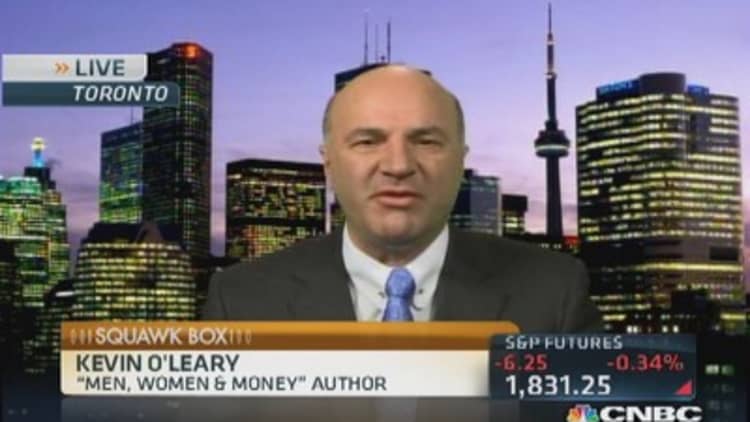As the minimum-wage debate gets fiercer and frothier, one major retailer has decided to open its bank account instead of its mouth and institute its own new entry-level wage. Gap informed its work force that it would institute a raise in wages, making the company's floor wage $9 an hour in 2014 and $10 an hour in 2015.
The current federal minimum wage is $7.25 an hour and there is a proposal to raise it to $10.10 an hour by 2016, which has stirred the debate.
(Read more: Carol Roth: Real solutions to America's jobs problem)
In a letter to employees Wednesday, Gap's Chairman and CEO Glenn Murphy said:
"…after many months of consideration, we've made a business decision that's right for our brands, good for our people and beneficial to our customers."
"To us, this is not a political issue. Our decision to invest in frontline employees will directly support our business, and is one that we expect to deliver a return many times over."
Bingo! This is how wage increases should happen, not through inflexible legislation.
(Read more: Minimum-wage debate is insane: 'Mr. Wonderful')
Employees are among the most important — if not THE most important — asset that a company has. Having a solid work force with strong morale is a true competitive advantage and that shows through to the customer. Those companies that appropriately compensate — both monetarily and non-monetarily — their employees have a better opportunity to attract quality employees and to retain those employees. Plus, in a retail environment where turnover is a significant, employee retention can lead to real cost savings for the company.
Those who don't treat their employees well (and for clarity, I am not saying that financial compensation is the only component of treating employees well) will suffer over time. They will have a more difficult time attracting and definitely keeping the best employees. This will force them over time to re-evaluate their policies or suffer in their business.
I am glad that Gap decided that it was in their best interests as a business to do more for their employees. That's always good news. But as Glenn Murphy said so eloquently, it shouldn't be a political issue. I, like so many others, am in favor of increased wages, but against further wage increases being legislated. Because while this change is a good business decision for Gap, it may not be for every business, particularly small businesses, including ones that are seasonal, that are just starting out or that are side businesses.
Now all eyes will be on Wal-Mart Stores, Inc., who, as the largest private employer in the US, has been front and center in the minimum wage debate. It's been reported this week that Wal-Mart's VP of Communications David Tovar said the company is looking at supporting a federal increase in the minimum wage. I think that this is a mistake.

(Read more: Jack Ablin: Why we should raise the minimum wage)
If Wal-Mart supports an increased minimum wage, it should put its money where its mouth is like Gap and do it, not ask for it to be mandated. If raising their wage is right for Wal-Mart, then it should step up like Gap did and do so. And while I haven't run any sophisticated financial models on it, I imagine that between positive PR and other employers using Wal-Mart as a wage benchmark, it could lead to more sales for the company, not to mention helping to reduce turnover. Moreover, I can hardly imagine that Wal-Mart wants more government interference in its business over time, so it shouldn't rely on it to force it into business decisions either. That's a bad precedent.
Organically increased wages by companies are welcomed and fervently encouraged. Those wage increases will hopefully benefit the sales of the companies making the changes and if not, they have the flexibility to make further adjustments. However, mandating wages increases from policy instead of business decisions will lead, as the CBO has projected, to substantial job losses and hurt not only business but the entry-level workers in the US who will find fewer opportunities to start their careers and gain skills.
We can have national discussions about issues that bring them to light, but we don't need legislation to take action. Legislation often has unintended consequences, so Washington, back off — the business community can handle this. If we can get the government out of the way, the market will be able to work properly and freely.
— By Carol Roth
Carol Roth is a "recovering" investment banker (corporate finance), entrepreneur/small-business owner, investor and author of "The Entrepreneur Equation." Follow her on Twitter @CarolJSRoth.

